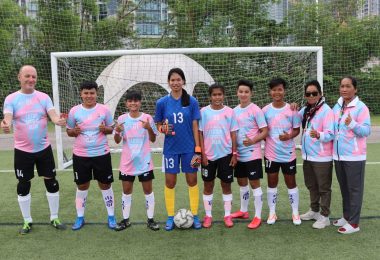Contrary to the growing trend of banning trans women from elite women’s sports, the International Cricket Council (ICC) has delivered “great news” for trans people by granting Danielle McGahey, a trans woman cricketer, permission to compete in the women’s category.
In August, ICC announced that Danielle has met the eligibility criteria and would be allowed to play in an official Twenty20 International tournament. This competition could potentially lead her to a spot in the 2024 Women’s T20 World Cup in Bangladesh.
The Australian-born cricketer, who now represents Canada, moved to Canada in 2020 to undergo medical transition. To meet the eligibility requirements, she must fulfill rather rigorous conditions, including submitting monthly serum blood tests to ensure her testosterone level remains below 5 nmol/L consistently. Additionally, she must undergo continuous evaluation by her psychiatrists to confirm her gender identity. Her performance will be tracked through metrics such as how many runs she scored against which opponents. ICC also mandates that she provide “relevant and reliable evidence” detailing all her sex reassignment procedures for ongoing “monitoring” by an Expert Panel.
Trans activists and communities have generally welcomed ICC’s decision to “maintain space” for trans women to compete. Danielle has also expressed her pride in participating as a trans athlete. However, this “inclusion” comes at a high cost. We find ourselves in a historical moment when we expect trans women to go above and beyond, often to an extreme degree, in order to prove that they are not “superior” to cisgender women. This is unfair treatment—unfair in the sense that no presumedly cisgender woman has to go through the same hurdles to validate her biological status and gender identity. And this discrimination is justified under the guise of maintaining “fairness” in women’s sports. Not too long ago, women athletes suspected of being men were subjected to humiliating “nude parades,” an early form of sex testing that forced women to strip down before a panel of so-called “experts” for inspection of their female anatomy. These policies have exposed (many cisgender) women of color to undue scrutiny, invasion of privacy, and surveillance.
As technology advances, it becomes evident that multiple factors, such as chromosomes, gonads, and hormones, play a role in categorizing sex. Which factors, then, should be used to define sex? The history of sex testing within the International Olympic Committee (IOC) demonstrates that when inspecting female genitalia cannot rule out the possibility of someone’s “male” status, the rules change (similar to the changes from testing chromosomes to testosterone level to male puberty).
However, when it becomes obvious that biological sex alone cannot completely eliminate unfairness between men and women (which it obviously cannot), anti-trans tropes turn to, paradoxically, cultural factors that may give trans women perceived “advantages” in women’s sports. They blame ICC for prioritizing inclusion over fairness, arguing that trans women possess cultural advantages by “reap[ing] the rewards of greater investment in their early cricketing career.” For instance, historically, men have had “more opportunities [to play cricket] both at school and recreationally, to learn, play, and hone their skills.” They have enjoyed more funding, better-equipped clubs, and more comprehensive training from dedicated coaches.
What is right about this claim is that “fairness in sport is not solely down to physiology” but is influenced by a combination of cultural factors. Not all trans women had the same opportunities as Danielle did to play cricket from a young age, long before transitioning. Not all trans women have access to the same financial resources, training facilities, coaches, and skills and techniques to excel in the sport. These cultural factors affect women as much as men.
The concept of “fairness,” as the anti-trans argument suggests, moves between certain biological and cultural factors. It is a term often used to justify the ban on trans athletes, and it is a constructed concept manipulated by supporters of transphobia to regulate the women’s category. Inclusion appears to be a mere tokenistic phrase that sports federations use to ensure trans women athletes never truly succeed. Inclusion is not enough when it means that only trans women and intersex players are singled out and subjected to unfair and inhumane treatment to prove their gender identity.
In response to accusations from transphobic organizations that ICC is “asleep” in its inclusion policy, I hope council members awaken to their role in perpetuating transphobic violence.
Siufung Law (they/them) comes from Hong Kong, is a TEDx speaker, a nonbinary professional bodybuilder, and Ph.D. student at Emory University. They are a trans activist actively promoting the transgender-only bodybuilding competition in Atlanta, GA, organized by the International Association of Trans Bodybuilders and Powerlifters (IATBP).







